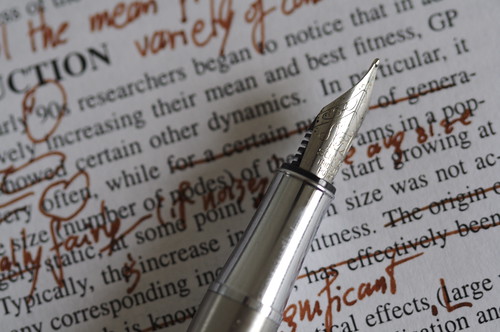According to newspaper reports, the educational academic Sugata Mitra, lessons in spelling 'have no place in 21st century schools'. His view is that the technology will sort it out for you.
I suppose he is thinking of things like predictive text, because he says:
Firstly, my phone corrects my spelling so I don’t really need to think about it and, secondly, because I often skip grammar and write in a cryptic way.
Also, that people should be free to express themselves in a variety of ways, such as “text speak”.
 Proofreading is labour-intensive, whatever technology you have on hand Photo by Nick McPhee http://www.flickr.com/photos/nics_events/By extension, does the same thing apply to writers? For the answer, have a trawl through reviews of self-published books, such as those for the Kindle on Amazon, or print-on-demand ones on Lulu. Sooner or later you are certain to come across a scathing review fulminating against the poor grammar and misspellings.
Proofreading is labour-intensive, whatever technology you have on hand Photo by Nick McPhee http://www.flickr.com/photos/nics_events/By extension, does the same thing apply to writers? For the answer, have a trawl through reviews of self-published books, such as those for the Kindle on Amazon, or print-on-demand ones on Lulu. Sooner or later you are certain to come across a scathing review fulminating against the poor grammar and misspellings.
The problem with the view that Mitra has expressed, and which I have heard expressed by others, is that they assume that devices like spell-checkers and predictive text can compensate for poor spelling.
They can’t, for the simple reason that in order to be able to use them you have to know how to spell in the first place, or at least to be aware enough to know that some spellings may need correcting. See, for example, the poem featured in the article No excuse for poor spelling: a spell-checker or predictive text would find all of it perfectly acceptable. And if you think that that is just an extreme case, you obviously haven’t been on the receiving end of one of my incomprehensible text messages, rendered so by a predictive text algorithm that “corrected” my message without my noticing.
In fact, even if Mitra were correct, and kids did not need lessons in spelling and grammar, they would still need lessons in how to check whether their predictive text has been accurate. But you can only do that if you know how the word should have been spelled in the first place.
So what of the writer who is erudite and articulate, but who is not very good at spelling? That’s where editors and proof-readers come in: it’s almost impossible to spot every error in your own work. (See 10 attributes of professional writers -- #6: Proofread properly.)
I don’t think anyone who aspires to earn money from writing, or even simply to have their work understood and enjoyed by others, can afford to rely solely on technology.
